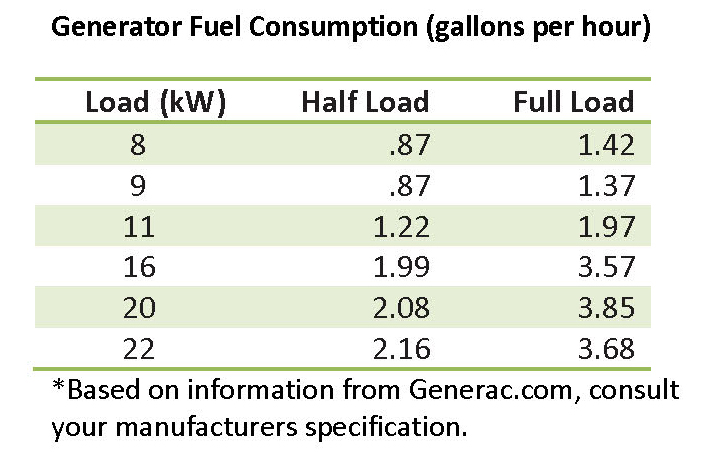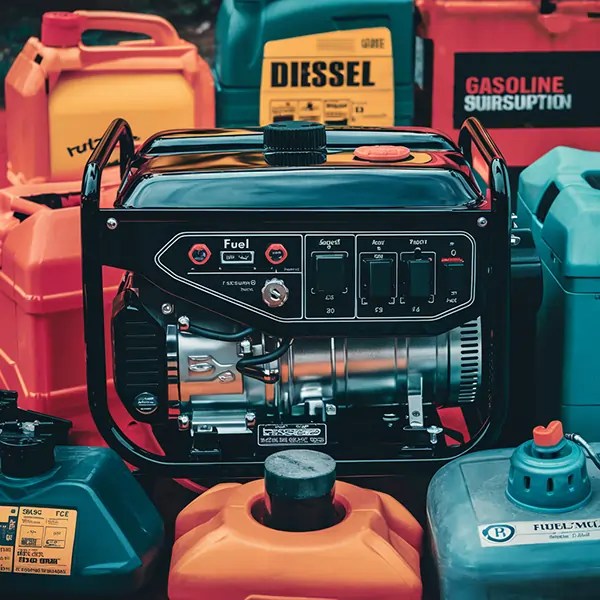Disclosure: This post contains affiliate links and I will be compensated if you make a purchase after clicking through my links. Learn More
A generator uses about 1 to 2 gallons of gas per hour. This depends on the size and type of the generator.
To understand this better, let’s explore what factors affect gas usage. Generators are essential for backup power. They keep homes and businesses running during outages. But, the cost of running a generator can add up quickly. Knowing how much gas a generator uses helps you plan and budget.
The type of generator, its load, and efficiency all play a role. Smaller generators might use less gas, while larger ones consume more. Understanding these details can save you money and ensure you have enough fuel during emergencies. Let’s dive deeper into the factors that influence gas consumption in generators.
Gas Consumption Of Generators
Generators typically consume about 0. 5 to 3 gallons of gas per hour. The exact amount depends on the generator’s size and load. Efficient models use less fuel while providing reliable power.
Understanding how many gallons of gas a generator uses per hour is essential for anyone relying on these machines for power. Whether it’s for camping trips, home backup during outages, or running your food truck business, knowing the fuel consumption can save you time and money. So, let’s dive into the factors that affect gas consumption and what typical usage looks like.Factors Influencing Usage
Several factors can influence how much gas your generator uses per hour. The generator’s size and power output play a significant role. A larger generator with higher wattage will naturally consume more gas. The type of load you’re running also affects consumption. Running a few light bulbs will use less gas compared to powering a refrigerator, air conditioner, or multiple devices simultaneously. Maintenance is another critical factor. A well-maintained generator runs more efficiently. Regular oil changes, clean filters, and proper storage can reduce fuel consumption.Typical Consumption Rates
You might be wondering, what are the typical consumption rates for generators? On average, a small 5,000-watt generator will consume about 0.75 gallons of gas per hour at 50% load. If you’re using it to power something more intensive, expect higher usage. Larger generators, like a 10,000-watt model, can use around 1.5 gallons per hour at 50% load. This can increase significantly with higher loads. Always check your generator’s manual for specific data, as these figures can vary. If you’re camping and using a small portable generator, it might only consume around 0.5 gallons per hour. This makes it easier to plan your fuel needs and ensure you have enough for your trip. Have you ever run out of gas in the middle of an important task? It’s frustrating and avoidable with proper planning. Knowing these consumption rates helps you prepare better and avoid unnecessary interruptions. So, next time you’re calculating how much fuel to store, consider these factors and typical rates. It’s all about making your experience smoother and more efficient.Types Of Generators
Generators are essential for providing power during outages. They come in various types, each with different fuel consumption rates. Understanding the types of generators helps in choosing the right one for your needs.
Portable Generators
Portable generators are compact and easy to move. They are ideal for temporary power needs. These generators use gasoline, propane, or diesel. On average, a portable generator uses between 0.5 to 2 gallons of gas per hour. The exact consumption depends on the load and the generator’s capacity.
Standby Generators
Standby generators are permanent installations. They automatically turn on during a power outage. These generators are larger and more powerful than portable ones. Standby generators typically use propane or natural gas. They consume around 1 to 3 gallons of gas per hour. The fuel consumption varies based on the load and the generator’s size.
Fuel Efficiency
Fuel efficiency is a crucial aspect when considering how many gallons of gas a generator uses per hour. Efficient generators save money and reduce environmental impact. Understanding fuel efficiency helps you make better choices about generator use.
Importance Of Efficiency
Efficient generators consume less fuel. This leads to lower operating costs. It also means fewer trips to refuel. Efficiency reduces carbon emissions. This is better for the environment. Efficient machines are also more reliable. They often require less maintenance.
Measuring Efficiency
To measure a generator’s efficiency, you need to know its fuel consumption rate. This is usually given in gallons per hour. Check the manufacturer’s specifications. Real-world conditions can affect this rate. Factors like load and maintenance play a role.
Another way to measure efficiency is to look at the generator’s runtime. This tells you how long it can run on a full tank. Compare this with the tank size to get an idea of fuel consumption. Always consider the load. A generator running at half load uses less fuel than one at full load.

Credit: www.easternpropane.com
Improving Efficiency
Generators typically use 0. 5 to 1 gallon of gas per hour. Fuel consumption depends on the generator’s size and load. Optimize efficiency by managing power usage.
Improving Efficiency Improving the efficiency of your generator can help you save money on fuel and reduce the environmental impact. By focusing on regular maintenance and using the right fuel, you can ensure your generator runs smoothly and efficiently.Regular Maintenance
Regular maintenance is crucial for keeping your generator in top shape. Simple tasks like changing the oil, checking the air filter, and inspecting the spark plugs can make a big difference. Neglecting these tasks can lead to a decrease in efficiency and increase fuel consumption. Set a schedule for maintenance checks to prevent any issues before they become costly problems. Imagine being stranded without power during a storm because your generator failed. Regular maintenance can help avoid such scenarios and keep your generator running efficiently.Using The Right Fuel
Using the right fuel is essential for maximizing your generator’s efficiency. Different generators require different types of fuel, such as gasoline, diesel, or propane. Using the wrong fuel can lead to higher consumption rates and potential damage. Always refer to your generator’s manual to determine the best fuel type for your model. Have you ever considered the impact of fuel quality on your generator’s performance? Opting for high-quality fuel can improve combustion and reduce the amount of fuel needed. Improving efficiency not only saves money but also ensures your generator is ready when you need it most.Alternative Fuels
Generators are essential during power outages or for off-grid living. While gas is the most common fuel, there are alternative fuels that can be more efficient or environmentally friendly. Let’s explore these options.
Propane
Propane is a clean-burning fuel. It produces fewer emissions than gasoline. This makes it a popular choice for environmentally conscious users. Propane is stored in tanks, which makes it easy to transport and store. It also has a longer shelf life compared to gasoline.
Generators running on propane use around 2 to 3 gallons per hour. This rate can vary based on the generator’s size and load. Propane generators are quieter and often more durable. They require less maintenance than gasoline engines.
Diesel
Diesel fuel is another alternative for generators. It is known for its efficiency and longevity. Diesel engines often run longer and require less frequent refueling. This makes them ideal for extended power needs.
Diesel generators consume about 0.4 to 0.6 gallons per hour. They are more efficient compared to gasoline and propane. Diesel engines are robust and can handle heavy loads better. They are often used in industrial and commercial settings.
Diesel fuel has a lower risk of ignition compared to gasoline. This adds a layer of safety for users. It also has a longer shelf life, which is useful for long-term storage.
Load Management
Understanding load management is vital for generator efficiency. It helps in optimizing fuel usage. Proper load management ensures the generator runs smoothly. It prevents wastage and extends the life of the generator.
Balancing Load
Balancing the load is crucial. Distribute the power demand evenly across the generator. Avoid connecting all high-wattage devices at once. This practice helps in reducing fuel consumption. It also minimizes wear and tear on the generator.
Use a power strip with multiple outlets. This helps in managing several devices. Turn off devices not in use. This simple step can save gallons of gas. It also keeps the generator running efficiently.
Avoiding Overloading
Overloading can damage the generator. It leads to higher fuel consumption. Always check the generator’s wattage capacity. Ensure not to exceed the recommended limits. This practice helps in maintaining optimal performance.
An overloaded generator can shut down unexpectedly. This can cause inconvenience and potential damage. Spread the load across multiple generators if needed. This approach ensures safety and efficiency.
Generator Size Selection
Choosing the right generator size can save both time and money. The size of your generator affects how much gas it uses per hour. Selecting the right generator size ensures you have enough power for your needs without wasting fuel.
Assessing Power Needs
First, list the appliances and devices you need to power. Add up their wattages to get the total power requirement. Don’t forget to include the starting wattages of devices with motors. This helps in selecting a generator that meets your power needs.
Choosing The Right Size
Generators come in various sizes, from portable to standby models. A small portable generator may use less gas but might not power all your devices. A larger standby generator can power your whole house but will use more gas. Consider your power needs and fuel efficiency to choose the right size. Remember, bigger isn’t always better. Select the generator size that balances power needs with fuel consumption.

Credit: famcocorp.ae
Cost Considerations
Using a generator involves various costs. Understanding these costs helps manage your budget. Fuel and maintenance are key expense areas.
Fuel Costs
Fuel costs depend on generator size and type. Larger generators use more fuel. On average, a generator uses about 0.75 gallons of gas per hour. Smaller, portable generators may use less. Fuel prices vary by location. Check local prices for accurate costs.
Maintenance Costs
Maintenance is essential for generator longevity. Regular oil changes and air filter replacements are necessary. These costs vary by generator type. Expect to spend on parts and labor. Routine checks prevent major issues. Well-maintained generators save money in the long run.

Credit: rtpowersystems.com
Frequently Asked Questions
How Long Will 5 Gallons Of Gas Last In A Generator?
A 5-gallon gas supply typically lasts around 8 to 12 hours in a generator, depending on the load and efficiency. Ensure the generator’s specifications for precise duration.
How Long Can A Generator Run On 10 Gallons Of Gas?
A generator can run approximately 8-12 hours on 10 gallons of gas, depending on load and efficiency.
How Long Will A 7500 Watt Generator Run On A Tank Of Gas?
A 7500 watt generator typically runs for about 8-12 hours on a full tank of gas, depending on load.
How Long Will A 4000 Watt Generator Run On 5 Gallons Of Gas?
A 4000 watt generator typically runs for 8 to 10 hours on 5 gallons of gas, depending on load.
Conclusion
Knowing how many gallons of gas a generator uses per hour helps plan fuel needs. Different generators consume different amounts. Factors like load and model matter. Regular checks ensure efficiency. Understanding this helps avoid running out of fuel. Always monitor usage for better performance.


